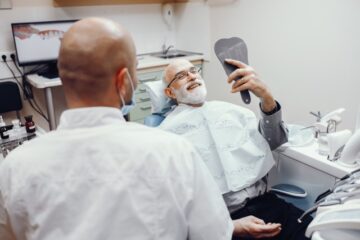Alternatives to Dentures: What Are Other Options For False Teeth?

Contents

In childhood, we all awaited the tooth fairy. It would be wonderful if she visited us in adulthood too, but with a small exception. Imagine the fairy not taking away milk teeth from under the pillow but, on the contrary, with a wave of her magic wand, replacing a missing permanent tooth with a beautiful, healthy new one. Dreaming is harmless. Unfortunately, instead of a tooth fairy, we have dentures. However, even they are not the limit of dreams.
In this article, we will explore alternative constructions to dentures that can help restore the integrity of the dental arch and the beauty of the smile. Without the tooth fairy and her friends.
What are Alternatives to Dentures?
Do you have one, several, or most of your teeth missing? Here are a few modern alternative options besides dentures that have come to us from the past century. These constructions are suitable for restoring the dental arch in various cases:
- Dental Implants
- Fixed Bridges
- Removable Partial Dentures
- Implant-Supported Dentures
- Mini Dental Implants
Next, let’s explore the features of these constructions, in which cases they will be the ideal solution, as well as their advantages and disadvantages from the patient’s perspective.
Dental Implants
Dental implants are indeed the marvel of modern medicine that we have long awaited. They are not just an alternative to false teeth; they are like a supersonic jet in a world where everyone travels by horse-drawn carriages. Such constructions allow for the complete replacement of a missing tooth with a durable artificial element. They consist of a titanium rod implanted into the jawbone and an external part – a solid dental crown. The crown is individually crafted and remarkably mimics the external part of the tooth, from its shape to its shade. The titanium alloy of the implant rod, compatible with human bone tissue, ensures a secure integration of the construction (minimizing the likelihood of rejection). It’s truly a fantastic innovation.
Most importantly, unlike crowns and dentures, implants do not damage adjacent healthy teeth. These individual constructions can be installed either as single implants for specific teeth or comprehensively (single-tooth implants but covering the entire dental arch).
Advantages of implants:
- Service life of 20-25 years and longer.
- Reliability of the construction.
- Ability to replace a single missing tooth in the dental arch without harming adjacent ones.
- Integrity of adjacent healthy teeth during installation.
- Remarkable aesthetics and functionality – implants look like natural teeth, combining strength and durability.
- Simple daily care – clean your teeth as usual and have regular check-ups with the dentist every 6-12 months.
Disadvantages:
- Installation involves multiple stages (embedding the rod, its integration, and only then the placement of the crown).
- A certain thickness of jawbone tissue is required for implant fixation (if insufficient, a dental surgeon may recommend bone grafting before implantation).
- The cost of the construction is somewhat higher than, for example, bridgework constructions.
Fixed Bridges
Dental bridges, like a 90s superstar, still shine today. And there’s a reason for that. Over the years, such constructions have proven their practicality, effectiveness, and affordability. If your insurance does not cover implantation, dental bridges likely do. If you are seeking an alternative to traditional dentures, a bridge might be what you need. But what exactly is it?
Fixed Bridges are a solid construction made up of 3 or 4 dental crowns. It allows for the restoration of the integrity of the dental arch in the absence of one tooth.
In this case, two healthy teeth (on either side of the missing one) serve as the “abutments” of the bridge.
The upper part of the enamel of these teeth is removed, and the prosthesis is fixed on them using dental cement (essentially durable dental crowns made of zirconia or metal-ceramics that replicate the anatomical shape of the teeth). In the place of the missing tooth, there is also a solid crown – all of this together forms the dentures. It is a respectable option for dentures and an excellent opportunity to fill the gap in the dental arch.
Advantages of dental bridges:
- Durability and aesthetics
- Affordable cost of prosthetics
- Quick installation (you can acquire a renewed smile in just a few sessions)
Disadvantages:
- Require systematic professional cleaning due to the possibility of food particles getting under the middle crown and causing an unpleasant odor.
- Necessitate altering the integrity of adjacent healthy teeth.
- Service life up to 10 years.
- Not possible to install a prosthesis in the absence of more than 2 consecutive teeth, as the bridgework construction would be unreliable.
Removable Partial Dentures
Removable partial dentures are also an alternative to traditional dentures. These constructions have a plate-like shape that is secured in the dental arch using special hooks – clasps or similar fasteners. They have an acrylic base that replicates the curvature of the dental arch and, in color, resembles the gum. Crowns, which replace missing teeth, are fixed on this acrylic base, and there are openings for natural teeth. Such a prosthesis is well secured on healthy teeth thanks to the hooks, allowing the patient to feel comfortable throughout the day without worrying that the prosthesis may shift or fall out of the mouth. It can be removed at night and after meals for cleaning.
Advantages:
- Individually crafted
- Affordable cost
- Easy fixation
- Possibility to remove and put on the construction as needed
- Restores the dental arch and adds natural aesthetics to the smile
Disadvantages:
- Possible discomfort and a prolonged adjustment period to the prosthesis
- The construction is not very durable
- Can change color and absorb odors
- The process of chewing food may not be the same as with natural teeth.
Implant-Supported Dentures
A fantastic alternative to dentures, it enables the full restoration of both the upper and lower dental arch. It becomes an excellent solution in the absence of most or all teeth. A variation of such prosthetics is also known as overdentures. The distinctive feature of these constructions is as follows:
- The external part of the prosthesis is the same acrylic plate with crowns that fully replicates the gum area with beautiful teeth. However, unlike a removable prosthesis of this type, this construction is securely fixed in the oral cavity.
- Implants are used for the fixation of the prosthesis. They are installed in the dental arch not tooth to tooth but as supports. For example, 6-8 implants along the dental arch.
- Once the implants have integrated, the prosthesis is fixed in the oral cavity, appearing aesthetically pleasing and allowing for the full enjoyment of solid foods without the fear of the prosthesis falling into a cup of tea.
Advantages:
- Ability to restore the dental arch even if teeth are completely missing.
- Secure fixation in the oral cavity.
- Cost-effective compared to the comprehensive implantation of each tooth.
Disadvantages:
- The need to remove any remaining teeth in the arch, even singular ones, for prosthesis placement.
- The duration of the prosthetic process, as implants must first be integrated, followed by waiting for their full osseointegration (which can take up to 6 months).
Mini Dental Implants
Mini dental implants are an alternative not only to dentures but also to standard implants. These structures have a smaller post that is implanted into the bone tissue. As a result, they integrate faster, cost less, and allow for implantation in a single session without prior manipulations, even in cases where the bone tissue at the implantation site is thin enough to preclude the use of a standard implant.
Advantages:
- Cost less than standard implants
- Can be installed as an alternative to implants in cases of insufficient bone thickness, without the need for a preliminary jawbone augmentation procedure.
- Allow for the restoration of even a single tooth.
Disadvantages:
- Service life is 7-9 years, which is decent but considerably shorter than that of traditional implants.
- Have less support from the jawbone as they are not fixed very deeply due to their smaller size.
These are the primary alternatives to dentures with artificial teeth. Knowing the available options will make it easier for you to decide which prosthetic method may be the ideal solution for you. However, it is advisable to communicate your preferences to your orthodontic dentist, who, based on the clinical picture, will suggest the optimal prosthetic approach for your case.
Factors to Consider When Choosing Denture Alternatives
Alternatives to dentures open up numerous possibilities for patients to turn their dreams of restoring the beauty of their smiles and dental arch into reality. There’s no need for a tooth fairy in this case. However, the dilemma arises in understanding which option will be ideal for you. Your dentist or the team at our clinic, Vip Dental Care, can help you navigate this decision. Here are the factors that may influence the choice of prosthetic method:
- The number of missing teeth.
- Anatomical features and clinical condition.
- Your preferences regarding the prosthetic method.
- Your preferences regarding the duration of prosthetic treatment.
- Options covered by your insurance policy.
- Your financial capabilities and preferences.
All these nuances and more are discussed individually with each patient, considering the specific situation and preferred options. If you want to acquire a beautiful smile as quickly as possible and fully enjoy your favorite delicious food (not just purees), schedule a consultation at our clinic. We’ll be happy to assist you with prosthetic solutions, utilizing the best modern techniques and methodologies.
Additional Resources
Forbes – Dentures: Benefits, Types And Costs
American Dental Association – Dentures













